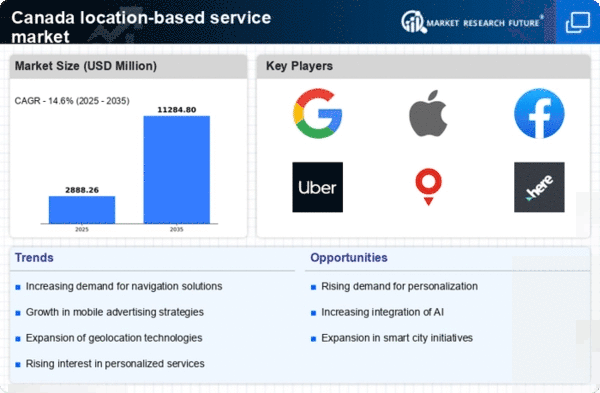Expansion of 5G Networks
The expansion of 5G networks across Canada is poised to significantly enhance the location based-service market. With increased bandwidth and lower latency, 5G technology enables real-time data processing and location tracking, which is crucial for applications such as navigation, ride-sharing, and location-based advertising. As of November 2025, it is estimated that over 80% of urban areas in Canada have access to 5G, facilitating a more robust infrastructure for location based-services. This technological advancement not only improves user experience but also encourages businesses to invest in location-based applications, thereby driving growth in the market. The location based-service market is likely to see a surge in innovative solutions that leverage 5G capabilities, making it a key driver for future developments.
Rising Demand for Personalized Services
The increasing consumer expectation for personalized experiences is a significant driver in the location based-service market. Canadians are increasingly seeking tailored services that cater to their specific needs, preferences, and locations. This trend is reflected in the growing use of location-based marketing strategies, which allow businesses to deliver targeted promotions and advertisements based on user location. According to recent data, approximately 65% of Canadian consumers express a preference for personalized offers, indicating a strong market potential. As businesses strive to meet these expectations, the location based-service market is likely to expand, with companies investing in technologies that enhance personalization through geolocation data. This demand for customized experiences is expected to shape the future landscape of the market.
Growth of E-commerce and Delivery Services
The rapid growth of e-commerce and delivery services in Canada is significantly impacting the location based-service market. As online shopping becomes increasingly prevalent, businesses are leveraging location-based technologies to optimize delivery routes and enhance customer satisfaction. In 2025, it is projected that e-commerce sales in Canada will reach approximately $50 billion, with a substantial portion attributed to location-based logistics solutions. This trend not only improves operational efficiency but also enhances the customer experience by providing real-time tracking and updates. The location based-service market is thus experiencing a surge in demand for innovative solutions that facilitate seamless integration between e-commerce platforms and location-based services, driving further growth in this sector.
Increased Investment in Smart City Initiatives
The Canadian government's commitment to developing smart cities is a crucial driver for the location based-service market. Smart city initiatives aim to enhance urban living through the integration of technology and data-driven solutions. As cities invest in infrastructure that supports IoT devices and location-based applications, the demand for location services is expected to rise. For instance, cities like Toronto and Vancouver are implementing smart traffic management systems that utilize real-time location data to improve traffic flow and reduce congestion. This investment not only enhances public services but also stimulates the location based-service market by creating opportunities for businesses to develop innovative applications that cater to urban needs. The focus on smart city development is likely to shape the future of location-based services in Canada.
Growing Awareness of Location-Based Safety Features
The increasing awareness of safety features associated with location-based services is emerging as a significant driver in the market. Canadians are becoming more conscious of personal safety and security, leading to a heightened interest in applications that offer location tracking and emergency services. Features such as location sharing and geofencing are gaining traction among users, particularly in the context of personal safety and emergency response. Recent surveys indicate that over 70% of Canadians consider location-based safety features essential when choosing mobile applications. This growing awareness is likely to propel the location based-service market forward, as developers prioritize safety functionalities in their offerings. Consequently, the demand for location-based safety solutions is expected to increase, influencing market dynamics.
















